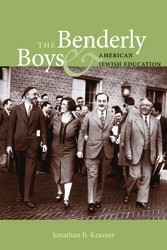Readers who know a bissel Yiddish will recognize that the translation of the title of Rabbi Marvin Hier’s memoir is bershert: it was Rabbi Hier’s destiny to be a messenger and a custodian of the history of the Holocaust for the Jewish people and the world.
Rabbi Hier first heard the word “Holocaust” at the age of ten while waiting outside his family’s synagogue during Yizkor, the prayer for the dead, when he learned of those who had lost parents and other relatives. Two years later, while practicing the Haftorah for his bar mitzvah, his rabbi interrupted him to tell him, “Every bar mitzvah boy has an opportunity to make up for what the Nazis took from us.” As a teenager, he wondered how the Jews of Poland could have ignored Jabotinsky’s plea that they should flee, that catastrophe was near. Fifty years later, deeply moved when Ehud Barak visited Auschwitz and mourned that the Israelis were half a century too late, Rabbi Hier remembered. Little by little, as he rose in the Orthodox hierarchy in Vancouver, WA, he formed associations and understandings not only with other Jewish denominations, but also with a widening spread of Christian and other groups, including those engaged in the struggle to liberate Soviet Jewry and remedy other injustices. As the rabbi’s prominence grew to include standing relationships with heads of state, British royalty, and presidents of universities, so did his inspirations: first to start a yeshiva in Los Angeles, a city that was sorely lacking in this type of Jewish education, and later on, a yeshiva for women. As each project attracted backers, and each inspiration led to the next, he added campaigns against antisemitism and anti-Zionism.
Also of great interest are the rabbi’s stories about Hollywood films that depict courageous Jews, such as “Unlikely Heroes,” about Rabbi Pinchas Rosenbaum who outmaneuvered, out talked, and outsmarted some of the Nazis by sending nearly 400 children to Palestine; this would eventually be followed by the establishment of the Wiesenthal Center’s own film studio, Moriah Films. These and many other stories can be found in this treasured book.
The little boy who grew up to be Rabbi Hier, the indomitable, unshakeable founder and creator of the Simon Wiesenthal Center of Los Angeles named in honor of the famed Nazi hunter, is the same little boy who hailed from New York’s Lower East Side, responding as he matured to the needs of Jews and Judaism the world over. We are lucky to have him and his memoir. Meant to Be is not only inspiring, but also a great read that reflects his humor, humble approach, inspirations, and ability.
Related Content:





